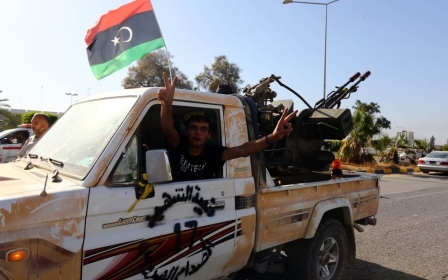Madrid: Military intervention not the way forward for Libya

Madrid conference
A conference held in Madrid on Wednesday, (the Ministerial Conference on Stability and Development in Libya) which included delegates from the Libyan House of Representatives (HoR) and from 21 foreign governments, concluded that there should be no recognition for a “parallel government” in Libya.
This was a reference to the GNC, the former government whose mandate elapsed two months ago and which was not invited to the summit.
It was also unanimously agreed that "there is no military solution to the current crisis".
"We are convinced that it is impossible for us to overcome terrorism only through air strikes," Libya’s foreign minister Abdulaziz said in Madrid.
There has been a recent series of airstrikes carried out by mystery planes over Libya, the latest one taking place on Monday, in which one person was killed in the town of Gharyan.
American authorities have blamed Egypt and the UAE for some of the recent airstrikes but both countries have denied the charges.
Abdulaziz said his government is "not inviting any country to do any kind of military intervention in Libya. What we have seen is foreign intervention has always lead to disaster".
Call for dialogue and new government
Speaking at a conference after the meetings in Madrid, Abdulaziz said that the summit had also recommended “urgent dialogue between the Libyan factions, with the exception of those that carry weapons and do not recognise dialogue.”
GNC-affiliated militias were able to seize key sites in Tripoli, after drawn-out battles for control of the International Airport.
After the summit concluded in Madrid confirming international support for the HoR back in Libya, the house passed a sweeping new anti-terror law composed of 30 articles.
The law seeks to define more closely “terrorist activities” in Libya, and impose further sanctions against people engaging in such activities.
Abdullah al-Thani, head of Libya’s House of Representatives (HoR) in Tobruk, is facing serious challenges over the formulation of his “crisis government”, which some suggest could be enough to topple his leadership.
He has until Saturday to propose a new cabinet, after HoR delegates rejected his suggested government during a meeting in Tobruk on Wednesday.
Thani’s proposed government had included Thani himself as defence minister and former head of the National Transitional Council Abdul Hafiz Ghoga as justice minister.
It also included two women, Farida al-Alaqi as foreign minister and Um al-Khair al-Ziraqi in charge of the country's health portfolio.
Delegates rejected Thani’s proposed cabinet composed of 18 ministers, preferring a stripped-back crisis government of 10 officials, according to the Libya Herald.
Representatives also told the site that they rejected the suggestion that an official could be in charge of more than one ministry under Thani’s proposed cabinet.
A representative who spoke to Arabic news site Arabi21, however, said the delegates had rejected one of the names proposed by Thani.
Names of possible successors to Thani are already being circulated, reports pan-Arab daily al-Hayat.
Among the people being suggested as the next head of the HoR is Ali al-Takbali, a vociferous opponent of the Libya Dawn militias who hold control of the capital Tripoli.
A demonstration in Tripoli protesting against the convening of the HoR, which is in an ongoing struggle for power with General National Council (GNC), included the ritual hanging of an effigy depicting Takbali.
Assassination attempt on brother of proposed foreign minister
Highlighting the challenges faced not only by Thani but also by HoR delegates, the brother of the proposed foreign minister was targeted in an assassination attempt on Wednesday evening.
Mahmoud al-Alaqi, brother of the proposed foreign minister Farida al-Alaqi, was sprayed with bullets as he and a companion walked near the foreign ministry headquarters in Tripoli.
Alaqi’s companion was killed in the attack, though Alaqi survived.
In Benghazi, the former chief commander of the Libyan Air Force, Ahmed al-Habib, was gunned down.
Habib's assassination came a year after he stepped down from the top post in Libya's air forces.
Madrid conference
A conference held in Madrid on Wednesday, which included delegates from the HoR and from 21 foreign governments, concluded that there should be no recognition for a “parallel government” in Libya.
This was a reference to the GNC, the former government whose mandate elapsed two months ago and which was not invited to the summit.
Speaking at a conference after the meetings in Madrid, Libya’s foreign minister said that the summit had recommended “urgent dialogue between the Libyan factions, with the exception of those that carry weapons and do not recognise dialogue.”
GNC-affiliated militias were able to seize key sites in Tripoli, after drawn-out battles for control of the International Airport.
After the summit concluded in Madrid confirming international support for the HoR back in Libya, the house passed a sweeping new anti-terror law composed of 30 articles.
The law seeks to define more closely “terrorist activities” in Libya, and impose further sanctions against people engaging in such activities.
Stay informed with MEE's newsletters
Sign up to get the latest alerts, insights and analysis, starting with Turkey Unpacked
Middle East Eye delivers independent and unrivalled coverage and analysis of the Middle East, North Africa and beyond. To learn more about republishing this content and the associated fees, please fill out this form. More about MEE can be found here.




